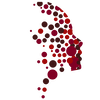Coughing, when it happens continuously throughout the day, can be not only a nuisance to the patient, but in many cases, disruptive to normal activity. A chronic cough is considered to be one that is long-standing in nature, extending over several weeks, months or even years.
The coughing behavior itself can range from simple throat clearing behavior to more violent coughs and even coughing bouts that lead to emesis (vomiting). It is important to have a comprehensive examination to ensure there is no problem with the heart, lungs or airways that is causing or contributing to the cough.
In this practice, we may receive referrals from outside physicians after a full work-up, many times by multiple different specialists, has failed to find a cause for the coughing behavior.
After the otolaryngology examination has ruled out any pathology, disease, obstruction or other abnormality that may be causing your cough, you will typically be referred for further evaluation by the SLP staff.
The SLP staff is extremely skilled in helping patients with their chronic cough. Helping patients gain a comprehensive understanding of the cough, as well as how prescribed treatments and methodologies will help to relieve the cough, is a primary goal.
This is a typical profile for a patient presenting with a chronic cough in this office:
The coughing behavior itself can range from simple throat clearing behavior to more violent coughs and even coughing bouts that lead to emesis (vomiting). It is important to have a comprehensive examination to ensure there is no problem with the heart, lungs or airways that is causing or contributing to the cough.
In this practice, we may receive referrals from outside physicians after a full work-up, many times by multiple different specialists, has failed to find a cause for the coughing behavior.
After the otolaryngology examination has ruled out any pathology, disease, obstruction or other abnormality that may be causing your cough, you will typically be referred for further evaluation by the SLP staff.
The SLP staff is extremely skilled in helping patients with their chronic cough. Helping patients gain a comprehensive understanding of the cough, as well as how prescribed treatments and methodologies will help to relieve the cough, is a primary goal.
This is a typical profile for a patient presenting with a chronic cough in this office:
- All previous diagnostic examinations are normal.
- Typical cough medicines (except those with Codeine), are ineffective.
- Dry cough (no significant mucous is coughed).
- Cough began during or after an upper respiratory illness (i.e., could, flu).
- Cough has been persistent for several weeks, months or even years.
- Coughing now is commonly triggered by a tickle.
- Patients wake up coughing.
- Coughing can lead to sense of being strangled, even vomiting.
Understanding a Cough
There are two general types of coughs. One is reflexive or involuntary, triggered by a reflex in the larynx; while the other is volitional, or under our control.
Reflexive - Involuntary Cough
The larynx (voice box) sits at the top of the trachea (windpipe). It is able to open and close, acting much like a valve, and therefore able to control the flow of air during breathing. Intrinsic to the larynx (part of it) are nerve endings capable of producing reflexes when stimulated. One such reflex is a cough. This is typically triggered when the larynx senses that something has penetrated this upper portion of the airway. The cough, then, acts as a protective mechanism, serving to cough out or expel something at risk for being inhaled.
There are normal reflexive thresholds or “triggers” that exist in the larynx. When these thresholds are lowered (i.e., more sensitive), less stimulation is required to trigger a cough.
There are normal reflexive thresholds or “triggers” that exist in the larynx. When these thresholds are lowered (i.e., more sensitive), less stimulation is required to trigger a cough.
Volitional Cough
This is a cough that is produced, on purpose, usually to accomplish something. For example, if you feel your throat is not clear when trying to talk, you may cough to try to clear and produce a better voice. Often times, mucous or drainage in the throat, perhaps pooling or irritating, may cause a person to purposely cough and clear. A volitional cough is NOT the result of a reflex, although many times, patients are unaware they are doing this.

